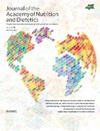Are People Consuming the Diets They Say They Are? Self-Reported vs Estimated Adherence to Low-Carbohydrate and Low-Fat Diets: National Health and Nutrition Examination Survey, 2007-2018
IF 4
2区 医学
Q2 NUTRITION & DIETETICS
Journal of the Academy of Nutrition and Dietetics
Pub Date : 2025-02-01
DOI:10.1016/j.jand.2024.07.006
引用次数: 0
Abstract
Background
Mischaracterization of dietary intake by patients and study participants is a common problem that presents challenges to clinical and public health approaches to improve diet quality, identify healthy eating patterns, and reduce the risk of chronic disease.
Objective
This study examined participants’ self-reported adherence to low-carbohydrate and low-fat diets compared with their estimated adherence using up to 2 24-hour recalls.
Design
This cross-sectional study acquired data on dietary intake from respondents in the National Health and Nutrition Examination Survey, 2007-2018.
Participants/setting
This study included 30 219 respondents aged 20 years and older who had complete and reliable dietary data and were not pregnant or breastfeeding.
Main outcome measures
The main outcome was prevalence of self-reported and estimated adherence to low-carbohydrate or low-fat diet patterns.
Statistical analyses performed
Self-reported adherence to low-carbohydrate or low-fat diets was evaluated using responses to questionnaires. Estimated adherence to these diets was assessed using data from up to 2 24-hour recalls and usual intake methodology developed by the National Cancer Institute.
Results
Of the 1.4% of participants who reported following a low-carbohydrate diet, estimated adherence (<26% energy from carbohydrates) using 24-hour recalls was 4.1%, whereas estimated adherence among those that did not report following a low-carbohydrate diet was <1% (P value for difference = .014). Of the 2.0% of participants who reported following a low-fat diet, estimated adherence (<30% energy from fat) was 23.0%, whereas estimated adherence among those who did not report following a low-fat diet was 17.8% (P value for difference = .048).
Conclusions
This research demonstrates that most individuals mischaracterized their diet pattern when compared with up to 2 24-hour recalls. These findings emphasize the need for clinicians and public health professionals to be cautious when interpreting individuals’ self-reported diet patterns, and should aim to collect more detailed dietary data when possible.
人们的饮食是否如他们所说的那样?低碳水化合物和低脂肪饮食的自我报告与估计遵守情况:2007-2018年全国健康与营养调查。
背景:患者和研究参与者对膳食摄入量的错误描述是一个常见问题,这给临床和公共卫生方法带来了挑战,不利于提高膳食质量、确定健康饮食模式和降低慢性病风险:本研究对参与者自我报告的低碳水化合物和低脂肪饮食的坚持情况与他们通过最多两次 24 小时回忆估计的坚持情况进行了比较:这项横断面研究从 2007-2018 年美国国家健康与营养调查(NHANES)的受访者那里获得了有关饮食摄入的数据:这项研究包括30219名年龄≥20岁的受访者,他们拥有完整可靠的膳食数据,且未怀孕或哺乳:主要结果是自我报告和估计的低碳水化合物或低脂肪饮食模式的坚持率:采用问卷调查的方式评估自我报告的坚持低碳水化合物或低脂肪饮食的情况。对这些饮食的估计依从性是通过国家癌症研究所制定的最多两次 24 小时回忆数据和通常摄入量方法进行评估的:结果:在 1.4% 的参与者中,有 1.4% 的人报告说自己正在进行低碳水化合物饮食,但估计的坚持率(结论:低碳水化合物饮食并不适合所有的人:这项研究表明,与最多两次的 24 小时回忆相比,大多数人都错误地描述了自己的饮食模式。这些发现强调,临床医生和公共卫生专业人员在解释个人自我报告的饮食模式时需要谨慎,并应尽可能收集更详细的饮食数据。
本文章由计算机程序翻译,如有差异,请以英文原文为准。
求助全文
约1分钟内获得全文
求助全文
来源期刊

Journal of the Academy of Nutrition and Dietetics
NUTRITION & DIETETICS-
CiteScore
7.20
自引率
10.40%
发文量
649
审稿时长
68 days
期刊介绍:
The Journal of the Academy of Nutrition and Dietetics is the premier source for the practice and science of food, nutrition, and dietetics. The monthly, peer-reviewed journal presents original articles prepared by scholars and practitioners and is the most widely read professional publication in the field. The Journal focuses on advancing professional knowledge across the range of research and practice issues such as: nutritional science, medical nutrition therapy, public health nutrition, food science and biotechnology, foodservice systems, leadership and management, and dietetics education.
 求助内容:
求助内容: 应助结果提醒方式:
应助结果提醒方式:


